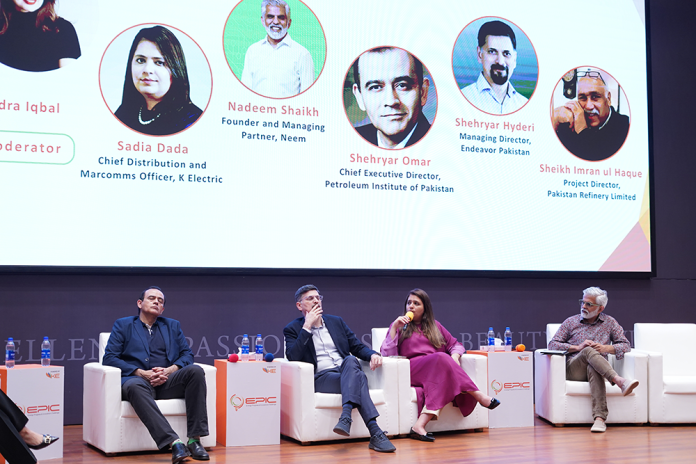K-Electric hosted the grand finale of its Energy Progress and Innovation Challenge (EPIC) 2025 at Habib University on Wednesday, a competition that drew over 250 entries since it began in March.
The three-month competition sought bold, local solutions to some of the country’s most pressing energy challenges, with entries from universities, think tanks, and startups.
At the heart of EPIC was a high-level panel discussion – ‘Powering Progress: Local Innovation for Pakistan’s Energy Future’ – featuring leading voices from energy, fintech, and entrepreneurship.
Discussions explored how innovation, policy, and inclusive financing can reshape Pakistan’s power sector, especially as the country grapples with surplus generation but electricity theft, complex tariff structures, and a lack of innovation agility.
Moderated by renowned anchorperson Sidra Iqbal, the panel hosted Sadia Dada, Chief Distribution and Marcomms Officer – KE, Shehryar Omar, CEO – Pakistan Institute of Petroleum (PIP), Shehryar Hydri, Managing Director – Endeavour Pakistan, and Nadeem Shaikh – Founder and Managing Director Neem. The participants gathered to explore a crucial question: how do we define — and deliver — efficiency in a country where access, affordability, and innovation collide?
Nadeem Shaikh highlighted how the integration of fintech tools into the clean energy sector is more than just a convenience – “it is a catalyst” as he animatedly remarked. “Fintech and digitalisation are innovating every sector, with micro-payment systems expanding access in both developed and developing markets,” he said.
“Inclusion is essential for the transformational impact of innovation. This shift is reflected in practical, localised solutions – from consumer loans that make solar units more affordable to flood rehabilitation efforts in Sindh, where housing finance has incorporated solar energy components.”
Sheryar Omar shared how PIP, in collaboration with Five Rivers, are working on capacity-building and training for the oil, gas, and power sectors – particularly in remote regions. “With digital tools like AR, VR, and AI just beginning to gain traction, these technologies are now being explored for frontline safety, theft prevention, and HSE training. We’re training for labour export,” he said, pointing to job opportunities in the Middle East that require globally competitive skills and how creating the space for innovation to take hold is imperative for meaningful impact.
Touching upon the future of energy, he stressed on the importance of changing mindsets to embrace increased electricity consumption. He shared that the tariff structure was designed at a time where demand exceeded supply and hence, additional consumption was discouraged through higher per unit rates. “That is not the case now as the country enjoys surplus energy,” he added.
Sadia Dada touched upon the structural and cultural hurdles slowing the progress of KE and the transition of the energy sector. Briefly touching upon KE’s planned Investment Plan 2030, she shared the target of increasing renewable energy generation’s share up to 30%. Highlighting the role of privatisation behind KE’s turnaround, she stressed how KE was the first DISCO to welcome competition by waving its exclusivity rights in the license renewal. “The Multi-Year Tariff applicable for FY24 – FY30 underpins the investment decisions during the same period that KE will take. Amid deep uncertainty, long-term planning is perhaps the biggest challenge KE faces,” she added, sharing that recovery is perhaps the biggest pain-point as cash-flows determine the investment levels. From fixed monthly payment plans that offset seasonal fluctuations to expanded e-billing and flexible weekly installments, KE has begun piloting solutions that address some of the challenges. “Compliance for new ideas needs agility,” Sadia said. “We’ve been sitting down with regulators to co-create these pathways.”
But she was frank about the broader difficulties, particularly the cultural hinderances which require an entire mentality upheaval.
“Electricity is still seen as a public good. There’s an expectation that it should be free,” she said. The current tariff structure, she mentioned, is largely out of their hands, sitting with the federal government. Inflation, complex regulation, and the high upfront costs of technological innovation all require sustained investment.
“Yet, the private sector is often expected to behave like a public entity. Profit-making is frowned upon,” she said, a viewpoint seconded by Shehryar Omar. “If we want quality, we have to build infrastructure and create a social movement that helps people understand the cost of their social actions.”
Shehryar Hydri connected the dots for a bird’s eye view of the bigger picture, pointing to a national need to conceptually define efficiency in energy. “Are efficiency and cost-effectiveness mutually exclusive?” he posed, before sharing that the answer may lie in the innovation ecosystem. “EPIC, a platform connecting disconnected players like KE with AI startups and energy tech companies, has seen over 250 applicants. KE can provide the platform for these companies to deploy solutions at scale,” he described. “That’s how sector-wide change happens.”
But challenges remain. “Clean energy is going to be expensive,” they all cautioned, particularly with no clear policy framework. Although the cost of solar panels has dropped and adoption is increasing, policy inconsistency continues to slow progress. With a more predictable and sustainable framework, they predicted that Pakistan’s energy mix could look very different in five to ten years. Moreover, implementing clean energy at the localized level like net-metring or roof-top solar prevents economies of scale from kicking in. Solarization of the grid is the definitive framework that policy makers need to adapt for clean energy to be cost effective.
Offering a final note of cautious optimism, Sadia Dada stated, “We have to reinvent ourselves. It requires faith, patience, and ongoing investment in the ecosystem,” she said. Relying on imports, she warned, is becoming untenable. Meanwhile, Shehryar Omar acknowledged the discomfort that comes with change. “Short-term pain,” they admitted, “is inevitable.”
As the event concluded, K-Electric reiterated its commitment to nurturing innovation through ongoing collaboration with academia, startups, and policy stakeholders. With EPIC 2025 positioning itself as a launchpad for scalable energy solutions, the initiative marks a significant step toward addressing Pakistan’s energy transition.


